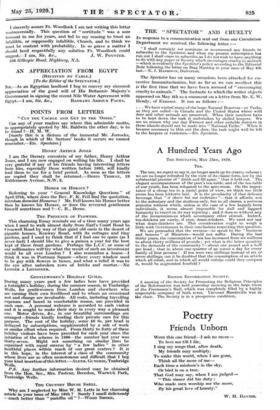A Hundred Years Ago
THE SPECTATOR, MAY 23RD, 1829.
TEA.
The urn, we regret to say it,no longer sends up its steamy column ; we are no longer refreshed by the view of its classic form, nor by the substantial promise of " drink and fill again " that it held out. The elegant accompaniment of the poet's tea-table, and of the tea-table of our youth, has been relegated to the ante-room. On the impor- tance of a cheap tea in a moral point of view we think too little stress has been hitherto laid. It is the peculiarity of that delicate beverage that " it cheers but not inebriates "—that it affords, not to the sedentary and the studious only, but to all classes, a nervous stimulus without which, unless in the case of a few happily-born individuals, it seems almost impossible for dull and laggard humanity to travel on its way rejoicing ; and it does so without any of the inconveniences which accompany other stimuli. Indeed, tea-drinkers are rarely, if ever, dram-drinkers. We need not say what dram-drinkers are. This consideration ought to weigh a little with Government in their conclusions respecting this question. We are persuaded that the revenue—to speak to the " business and bosoms " of Ministers—would not suffer. During the last; thirty years, the consumption of tea has increased from six millions to about thirty millions of pounds ; yet what is the latter quantity to the demands of the community ?—about one pound and a half per head ; that is, about one-quarter of an ounce a day for every family of four persons If tea were two shillings instead of six or seven shillings, can it be doubted that the consumption of an article which all relish, and in which all would indulge could they compass it, would be augmented fourfold ?








































 Previous page
Previous page